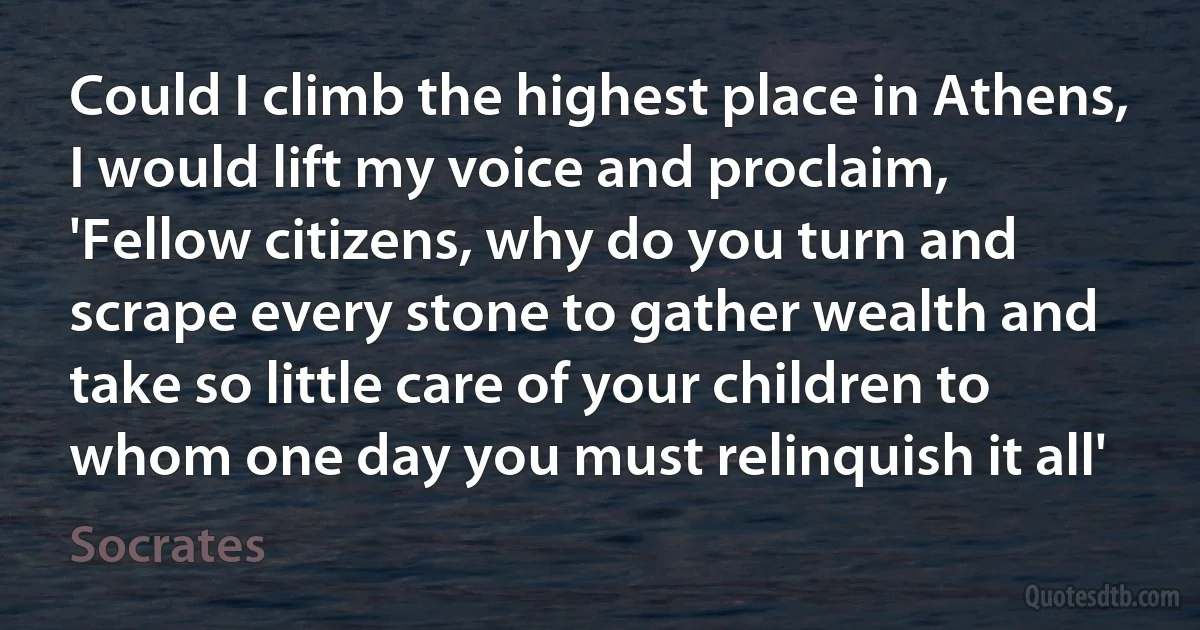Athens Quotes - page 5
In general, democracy and individualism have advanced in spite of and often against specific economic interest. Both democracy and individualism have been based upon financial sacrifice, not gain. Even in Athens, a large part of the 7,000 citizens who participated regularly in assemblies were farmers who had to give up several days' work to go into town to talk and listen.

John Ralston Saul
If Jerusalem falls into the hands of the Muslims, Athens and Rome will be next. Thus, Jerusalem is the main front protecting the West. It is not a conflict over territory but rather an ideological battle, between the mentality of the liberated West and the ideology of Islamic barbarism. There has been an independent Palestinian state since 1946, and it is the kingdom of Jordan.

Geert Wilders
It is truly a marvelous thing to consider to what greatness Athens arrived in the space of one hundred years after she freed herself from the tyranny of Pisistratus; but, above all, it is even more marvelous to consider the greatness Rome reached when she freed herself from her kings. The reason is easy to understand, for it is the common good and not private gain that makes cities great. Yet, without a doubt, this common good is observed only in republics, for in them everything that promotes it is practised, and however much damage it does to this or that private individual, those who benefit from the said common good are so numerous that they are able to advance in spite of the inclination of the few citizens who are oppressed by it.

Niccolò Machiavelli
That the Macedonians were of Greek stock seems certain. The claim made by the Argead dynasty to be of Argive descent may be no more than a generally accepted myth, but Macedonian proper names, such as Ptolemaios or Philippos, are good Greek names, and the names of the Macedonian months, although differed from those of Athens or Sparta, were also Greek. The language spoken by the Macedonians, which Greeks of the classical period found unintelligible, appears to have been a primitive north-west Greek dialect, much influenced by the languages of the neighboring barbarians.

J.R. Hamilton
When Europeans first thought up the AIT around 1820 (after having espoused the OIT for half a century) and then took it to India, many Indians simply denied that anyone had come from anywhere, and pointed out correctly that nothing amounting to what is known as the Aryan invasion (with the importation of Sanskrit from outside) is described in scripture... Both Sanskrit professor Nicholas Kazanas (Athens) and myself have many anecdotes up our sleeves of how any Homeland debate in which the OIT figures, is being stonewalled by AIT-leaning linguists... Then again, this genocide does exist, viz. as part of the Dravidianist mythology, especially in its missionary version, because of overcompensation for the real genocide of natives in the Americas that accompanied their Christianization. (Ch. 30)

Koenraad Elst
As the seventh century [BC] drew to a close, the bitterness of the helpless poor against the legally entrenched rich had brought Athens to the edge of revolution. Equality is unnatural; and where ability and subtlety are free, inequality must grow until it destroys itself in the indiscriminate poverty of social war; liberty and equality are not associates but enemies. The concentration of wealth begins by being inevitable, and ends by being fatal.

Will Durant
But why had science lost its way in the first place? What appeal could these teachings of Pythagoras and Plato have had for their contemporaries? They provided, I believe, an intellectually respectable justification for a corrupt social order. The mercantile tradition that had led to Ionian science also led to a slave economy. You could get richer if you owned a lot of slaves. Athens in the time of Plato and Aristotle had a vast slave population. All that brave Athenian talk about democracy applied only to a privileged few.

Carl Sagan
The first great frontal assault on the Enlightenment was launched by Jean-Jacques Rousseau (1712-1778). Rousseau has a well-deserved reputation as the bad boy of eighteenth century French philosophy. In the context of Enlightenment intellectual culture, Rousseau's was a major dissenting voice. He was an admirer of all things Spartan-the Sparta of militaristic and feudal communalism-and a despiser of all things Athenian-the classical Athens of commerce, cosmopolitanism, and the high arts. Civilization is thoroughly corrupting, Rousseau argued -- not only the oppressive feudal system of eighteenth-century France with its decadent and parasitical aristocracy, but also its Enlightenment alternative with its exaltation of reason, property, the arts and sciences. Name a dominant feature of the Enlightenment, and Rousseau was against it.

Jean-Jacques Rousseau

